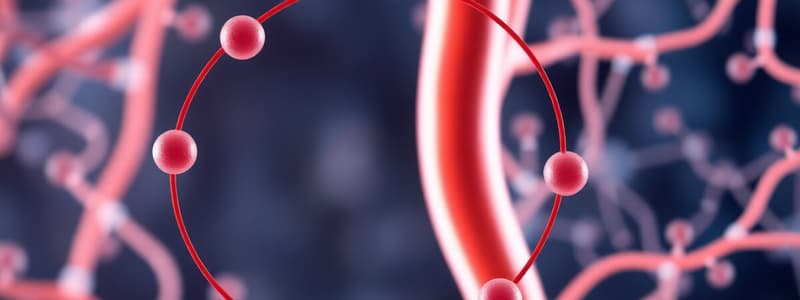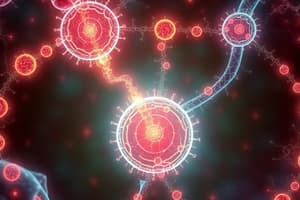Podcast
Questions and Answers
Which enzyme catalyzes the conversion of pyruvate to acetyl-CoA in the link reaction?
Which enzyme catalyzes the conversion of pyruvate to acetyl-CoA in the link reaction?
- Hexokinase
- Citrate synthase
- Malate dehydrogenase
- Pyruvate dehydrogenase (correct)
The link reaction occurs in which part of the cell?
The link reaction occurs in which part of the cell?
- Cytoplasm
- Mitochondrial matrix (correct)
- Nucleus
- Inner mitochondrial membrane
During the link reaction, one molecule of pyruvate produces how many molecules of NADH?
During the link reaction, one molecule of pyruvate produces how many molecules of NADH?
- 2
- 1 (correct)
- 3
- 4
Which of the following is released as a byproduct during the conversion of pyruvate to acetyl-CoA?
Which of the following is released as a byproduct during the conversion of pyruvate to acetyl-CoA?
The TCA cycle begins with the reaction between acetyl-CoA and which molecule?
The TCA cycle begins with the reaction between acetyl-CoA and which molecule?
Which enzyme catalyzes the first reaction of the TCA cycle?
Which enzyme catalyzes the first reaction of the TCA cycle?
How many NADH molecules are produced per acetyl-CoA molecule in one round of the TCA cycle?
How many NADH molecules are produced per acetyl-CoA molecule in one round of the TCA cycle?
Which intermediate in the TCA cycle is the direct precursor for the synthesis of fatty acids?
Which intermediate in the TCA cycle is the direct precursor for the synthesis of fatty acids?
The only enzyme in the TCA cycle that is embedded in the inner mitochondrial membrane is:
The only enzyme in the TCA cycle that is embedded in the inner mitochondrial membrane is:
In the TCA cycle, how many GTP (or ATP) molecules are produced per turn of the cycle?
In the TCA cycle, how many GTP (or ATP) molecules are produced per turn of the cycle?
Which TCA cycle enzyme is inhibited by high levels of ATP and NADH?
Which TCA cycle enzyme is inhibited by high levels of ATP and NADH?
Which complex in the electron transport chain is responsible for pumping protons and producing water?
Which complex in the electron transport chain is responsible for pumping protons and producing water?
The primary role of oxygen in oxidative phosphorylation is to:
The primary role of oxygen in oxidative phosphorylation is to:
Which molecule directly drives the synthesis of ATP by ATP synthase?
Which molecule directly drives the synthesis of ATP by ATP synthase?
Which complex of the electron transport chain does NOT pump protons across the membrane?
Which complex of the electron transport chain does NOT pump protons across the membrane?
What is the total number of ATP molecules produced from one molecule of NADH in oxidative phosphorylation?
What is the total number of ATP molecules produced from one molecule of NADH in oxidative phosphorylation?
Which organ is the primary site of gluconeogenesis in the body?
Which organ is the primary site of gluconeogenesis in the body?
In gluconeogenesis, pyruvate is first converted to which intermediate before entering the gluconeogenic pathway?
In gluconeogenesis, pyruvate is first converted to which intermediate before entering the gluconeogenic pathway?
Which enzyme converts oxaloacetate to phosphoenolpyruvate in gluconeogenesis?
Which enzyme converts oxaloacetate to phosphoenolpyruvate in gluconeogenesis?
Which of the following hormones promotes gluconeogenesis?
Which of the following hormones promotes gluconeogenesis?
Which energy molecules are consumed during gluconeogenesis?
Which energy molecules are consumed during gluconeogenesis?
Flashcards
What enzyme catalyzes the conversion of pyruvate to acetyl-CoA?
What enzyme catalyzes the conversion of pyruvate to acetyl-CoA?
Pyruvate dehydrogenase is an enzyme that catalyzes the conversion of pyruvate to acetyl-CoA in the link reaction.
Where does the link reaction occur?
Where does the link reaction occur?
The link reaction, also known as the pyruvate dehydrogenase complex reaction, takes place in the mitochondrial matrix, the innermost compartment of mitochondria.
How many NADH molecules are produced per pyruvate molecule in the link reaction?
How many NADH molecules are produced per pyruvate molecule in the link reaction?
One molecule of pyruvate generates one molecule of NADH during the link reaction. This NADH will later be used in oxidative phosphorylation to generate ATP.
What byproduct is released during the conversion of pyruvate to acetyl-CoA?
What byproduct is released during the conversion of pyruvate to acetyl-CoA?
Signup and view all the flashcards
What molecule does acetyl-CoA react with to start the TCA cycle?
What molecule does acetyl-CoA react with to start the TCA cycle?
Signup and view all the flashcards
Which enzyme catalyzes the first reaction of the TCA cycle?
Which enzyme catalyzes the first reaction of the TCA cycle?
Signup and view all the flashcards
How many NADH molecules are produced per acetyl-CoA molecule in the TCA cycle?
How many NADH molecules are produced per acetyl-CoA molecule in the TCA cycle?
Signup and view all the flashcards
Which TCA cycle intermediate is a precursor for fatty acid synthesis?
Which TCA cycle intermediate is a precursor for fatty acid synthesis?
Signup and view all the flashcards
Which TCA cycle enzyme is embedded in the inner mitochondrial membrane?
Which TCA cycle enzyme is embedded in the inner mitochondrial membrane?
Signup and view all the flashcards
How many GTP (or ATP) molecules are produced per turn of the TCA cycle?
How many GTP (or ATP) molecules are produced per turn of the TCA cycle?
Signup and view all the flashcards
Which TCA cycle enzyme is inhibited by high levels of ATP and NADH?
Which TCA cycle enzyme is inhibited by high levels of ATP and NADH?
Signup and view all the flashcards
Which complex in the electron transport chain is responsible for proton pumping and water production?
Which complex in the electron transport chain is responsible for proton pumping and water production?
Signup and view all the flashcards
What is the primary role of oxygen in oxidative phosphorylation?
What is the primary role of oxygen in oxidative phosphorylation?
Signup and view all the flashcards
Which molecule powers the synthesis of ATP by ATP synthase?
Which molecule powers the synthesis of ATP by ATP synthase?
Signup and view all the flashcards
Which complex of the electron transport chain does not pump protons?
Which complex of the electron transport chain does not pump protons?
Signup and view all the flashcards
How many ATP molecules are produced from one molecule of NADH in oxidative phosphorylation?
How many ATP molecules are produced from one molecule of NADH in oxidative phosphorylation?
Signup and view all the flashcards
What organ is the primary site of gluconeogenesis?
What organ is the primary site of gluconeogenesis?
Signup and view all the flashcards
What intermediate is pyruvate converted to before entering gluconeogenesis?
What intermediate is pyruvate converted to before entering gluconeogenesis?
Signup and view all the flashcards
Which enzyme converts oxaloacetate to phosphoenolpyruvate in gluconeogenesis?
Which enzyme converts oxaloacetate to phosphoenolpyruvate in gluconeogenesis?
Signup and view all the flashcards
Which hormone promotes gluconeogenesis?
Which hormone promotes gluconeogenesis?
Signup and view all the flashcards
What energy molecules are consumed during gluconeogenesis?
What energy molecules are consumed during gluconeogenesis?
Signup and view all the flashcards
What is the function of the link reaction?
What is the function of the link reaction?
Signup and view all the flashcards
What is the function of the TCA cycle?
What is the function of the TCA cycle?
Signup and view all the flashcards
What is oxidative phosphorylation?
What is oxidative phosphorylation?
Signup and view all the flashcards
What is gluconeogenesis?
What is gluconeogenesis?
Signup and view all the flashcards
What is the electron transport chain?
What is the electron transport chain?
Signup and view all the flashcards
Study Notes
Enzyme Catalysing Pyruvate to Acetyl-CoA Conversion
- Pyruvate dehydrogenase catalyses the conversion of pyruvate to acetyl-CoA in the link reaction.
Location of Link Reaction
- The link reaction occurs in the mitochondrial matrix.
NADH Molecules Produced
- One molecule of pyruvate produces one molecule of NADH during the link reaction.
Byproduct of Pyruvate to Acetyl-CoA Conversion
- Carbon dioxide (CO2) is released as a byproduct during the conversion of pyruvate to acetyl-CoA.
Initial Reaction of TCA Cycle
- The TCA cycle begins with the reaction between acetyl-CoA and oxaloacetate.
First Enzyme of TCA Cycle
- Citrate synthase catalyses the first reaction of the TCA cycle.
NADH Production per Acetyl-CoA Molecule in TCA Cycle
- Three NADH molecules are produced per acetyl-CoA molecule in one round of the TCA cycle.
Intermediate for Fatty Acid Synthesis
- Citrate is the intermediate in the TCA cycle that is the direct precursor for the synthesis of fatty acids.
Enzyme Embedded in Inner Mitochondrial Membrane in TCA Cycle
- Succinate dehydrogenase is the only enzyme in the TCA cycle embedded in the inner mitochondrial membrane.
GTP/ATP Production per TCA Cycle Turn
- One GTP (or ATP) molecule is produced per turn of the TCA cycle.
Enzyme Inhibited by High ATP and NADH Levels in TCA Cycle
- Isocitrate dehydrogenase is the enzyme inhibited by high levels of ATP and NADH in the TCA cycle.
Proton Pumping Complex in Electron Transport Chain
- Complex IV in the electron transport chain is responsible for pumping protons and producing water.
Oxygen's Role in Oxidative Phosphorylation
- Oxygen acts as the final electron acceptor in oxidative phosphorylation.
Molecule Driving ATP Synthesis
- The proton gradient directly drives the synthesis of ATP by ATP synthase.
Electron Transport Chain Complex Not Pumping Protons
- Complex II does not pump protons across the membrane in the electron transport chain.
ATP Production from NADH in Oxidative Phosphorylation
- Two and a half (2.5) ATP molecules are produced from one NADH molecule in oxidative phosphorylation.
Primary Site of Gluconeogenesis
- The liver is the primary site of gluconeogenesis in the body.
Pyruvate's First Conversion in Gluconeogenesis
- In gluconeogenesis, pyruvate is first converted to oxaloacetate.
Enzyme Converting Oxaloacetate to PEP in Gluconeogenesis
- Phosphoenolpyruvate carboxykinase (PEPCK) converts oxaloacetate to phosphoenolpyruvate in gluconeogenesis.
Hormone Promoting Gluconeogenesis
- Glucagon promotes gluconeogenesis.
Energy Molecules Consumed during Gluconeogenesis
- ATP and NADH are consumed during gluconeogenesis.
Studying That Suits You
Use AI to generate personalized quizzes and flashcards to suit your learning preferences.



